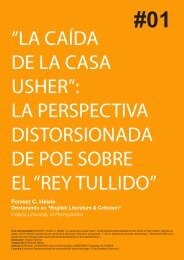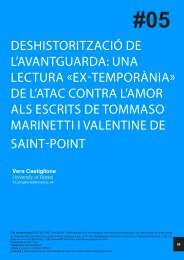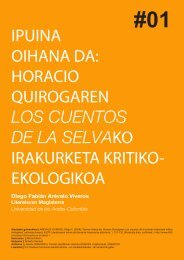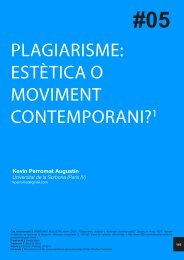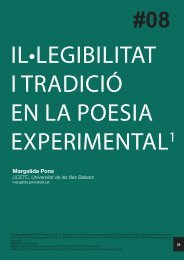I described earlier: hence its non-historical, representational nature.Seawater, thus, contains historical characters such as theindiano—the returning immigrant from the Americas— who isrepresented as villain in order to contain and disavow the colonial/imperial history of the Basque Country. As Aldekoa states:La defensa de la religión, el euskera y el patriotismo son su corolario [ofSeawater’s worldview]. Sin embargo, esta concepción del mundo quebusca el regazo de la tradición sufrirá el empuje destructor del presenteen forma de indianos que han perdido la fe y la lengua patrias y los“mamarrachos” y tipos indeseables con bigote que luchan por salir dela ignorancia o por mejorar su situación y perturban la armonía idílicadel país con sus blasfemias, irreligiosidad, racionalismo, ilustración,elecciones y socialismo. (2004:118-19)It is against both the working class gathered around Bilbao and theimmigrants returning from the Americas that Agirre attempts to write acostumbrista novel that isolates the fishing community of Arranondoand, ultimately, pushes him to move away from the coastal BasqueCountry to the more isolated representation of the Basque mountainsand farmstead. The indiano, usually a man, represents a double threat:he is the poor fisher who leaves the idyllic “colonial” representation ofthe small Basque village and, by “working” in the “historical” colonies,returns stereotypically rich, thus becoming a historical uncannyreminder, in reverse, of the representational colonialism that goeson in Agirre’s novels and, more generally, in Basque costumbrismo.Opposite Agirre, Etxeita wrote semi-autobiographical novels thatprecisely emphasized the emigrant: his own life history, as he sailedas a pilot and became a rich indiano in the Philippines before returningto Mundaka, his hometown. Yet, in Etxeita’s novels, historicalcolonialism is disavowed. More specifically Etxeita disavows his ownbiographical colonial history; he disavows the story of the indianowho has returned as a result of the colonial wars of independencein the Philippines. As a result, and counter Agirre’s novels, Etxeitacarries out colonial disavowal by refashioning the imperialist indianonot as colonizer, but as colonial/colonized subject. Etxeita’s indianosare poor native Basques who migrate to colonial lands to seekfortune and always return to the Basque Country to complete andgive meaning to their Basque and, thus, colonial subject position.Therefore Etxeita’s biographical colonial space par excellence, thePhilippines, is always mentioned marginally and, instead, is replacedby a post-colonial Latin America where Basque-Spanish colonialismhas been historically superseded since 1825. Moreover, in Etxeita’sstories no reference is made to economic exploitation, oppression,or any form of violence that might be associated with colonialism.His indianos earn their fortune directly from working the land—although they always become ranch owners who exploit native laborGaldós, Etxeita, Rizal – Madrid, Mundaka, Manila: On Colonial Disavowal and (Post) Imperial Articulations of the Hispanic Pacific-Atlantic - Joseba Gabilondo<strong>452ºF</strong>. #09 (2013) 13-41.32
force; the latter is always mentioned indirectly. In short, post/colonialexploitation is substituted with the ideology of the individual Basquefarmstead owner who works the land by himself, even in the Americas.When analyzing Etxeita’s Josetxo, Kortazar captures well thenon-costumbrista geography of the novel, derived from thecolonial disavowal of the Philippines, and the compensatoryor fantastic representation of a post-colonial Latin America:Espazioaren tratamendua ez da manikeoa, beste idazle kostunbristekohi dutenez, esperientziari loturikoa da. Dena dela, norberaren lurrarengoraipamena egiten da, nostalgia nagusitzen delarik espazioarentratamenduan.Nobela sentimentalak agintzen duen moduan, konfliktorik eza izangoda nobelaren alde narratiborik ahulena; ekintzen tratamenduan eremaiz erabili izan da Jaungoikoaren izena ekintzen eragile gisa. (2013,my emphasis)Therefore, Agirre and Etxeita’s novels have to be read as twosides of the same process of colonial disavowal of the BasqueCountry and its involvement in Spanish (and French) imperialism.Etxeita disavows historical colonialism (his own involvement in thePhilippines) whereas Agirre disavows representational colonialism(the touristic/nativists representation of the Basque Country).The above two strategies of colonial disavowal are even more complexif Etxeita’s entire biography is taken into consideration. In 1886, whilestill in Manila, Etxeita published his first novel in Spanish in that city: ashort fictionalized version of his biography, entitled Amoríos de Juanay Manuel y lo que es la madre a pesar de los pesares. This novelstill contained direct references to Manila and Filipino sailors. Yet, hewrote this first novel before Agirre began his career as novelist in theBasque Country in 1898 with a historical novel (Auñamendiko Lorea /The Flower of the Pyrenees). Agirre wrote Seawater in serialized formbetween 1902-1905 in a Basque journal, that is to say, in the postcolonialaftermath of The Desastre of 1898. In that very same year,Etxeita returned to his hometown and, eleven years later, in 1909he wrote his first novel in Basque about the life of a sailor, that is, amore fictionalized version of his earlier Spanish semi-autobiography:Josetxo (Little Joe). Thus, Etxeita wrote Josetxo (1909) after Agirre’ssecond novel about a Basque fishing village, Seawater (1902-1905).Galdós, Etxeita, Rizal – Madrid, Mundaka, Manila: On Colonial Disavowal and (Post) Imperial Articulations of the Hispanic Pacific-Atlantic - Joseba Gabilondo<strong>452ºF</strong>. #09 (2013) 13-41.As Etxeita shifted from Spanish to the “colonial” Basque languagein his second novel, references to the Philippines became moreliminal and were pushed into the past —the past of the hero’sfather. Moreover, Josetxo’s longer text made room for subplots thatquestion and ultimately further assert the hero’s Basque (colonial)origin. As Agirre wrote his third novel, Fern, between 1907 and 1912,33
- Page 1 and 2: 452ºF452ºF OriginalIssueVersióno
- Page 3 and 4: EDITORIAL en-452ºF Literaturaren T
- Page 5 and 6: EDITORIAL es-452ºF Revista de Teor
- Page 7 and 8: EDITORIAL ca-452ºF Revista de Teor
- Page 9 and 10: LAEDITORIA-eu-452ºF Literaturaren
- Page 11 and 12: 13 42 56JOSEBAGABILONDOGaldós, Etx
- Page 13 and 14: GALDÓS, ETXEITA,RIZAL - MADRID,MUN
- Page 15 and 16: The bullion [of silver coming from
- Page 17 and 18: Although Paul Gilroy’s disregard
- Page 19 and 20: Fortunata and Jacinta (1886-87), to
- Page 21 and 22: corresponde rigurosamente a la dial
- Page 23 and 24: the bourgeoisie, so that the former
- Page 25 and 26: los decía con desdén a la clase m
- Page 27 and 28: café culture and Galdós’s natur
- Page 29 and 30: itself as nation-state or, in Blanc
- Page 31: disavowal at the core of their nove
- Page 35 and 36: the local chamber of commerce and f
- Page 37 and 38: century in a double colonial geogra
- Page 39 and 40: spaces of dominated nationalism suc
- Page 41 and 42: JUARISTI, J. (1997): El bucle melan
- Page 45 and 46: Euskal Herriko sasietako urretxindo
- Page 47 and 48: Bizkitartean non daude euskal nobel
- Page 49 and 50: XX. mendeko emakume euskaradunen li
- Page 51 and 52: Aukeratu ditugun emazte idazleen te
- Page 53 and 54: prozesu fisiologiko horretaz.Emakum
- Page 55 and 56: BibliografiaAGIRRE, Katixa (2009):
- Page 57 and 58: 452ºFLaburpena || Bere burua euska
- Page 59 and 60: apologisten pentsamendu mitologiko
- Page 61 and 62: dezakegu mende bat beranduago, Grat
- Page 63 and 64: deritzolako desiragarri begirada ko
- Page 65 and 66: abian jarriko duten idazleek Sabino
- Page 67 and 68: Txillardegik ETA erakundearen sorku
- Page 69 and 70: Halere, historiak, batzuetan totelk
- Page 71 and 72: literarioa aniztu ahala- pixkanaka
- Page 73 and 74: ondorio. Atxagari dagokionean, berr
- Page 75 and 76: delako aspalditxotik, eta euskal po
- Page 77 and 78: BibliografiaATXAGA, B. (1982): «Eu
- Page 79 and 80: 452ºFLaburpena || Artikulu honen x
- Page 81 and 82: expresa por medio de enigmas y mist
- Page 84 and 85:
erezia» (Atxaga et al., 1975). Min
- Page 86 and 87:
poesía irrealista y evasiva, forma
- Page 88 and 89:
lotzeko nahia agertzen baita: «Mun
- Page 90:
du, hain zuzen, literatur historia
- Page 93 and 94:
kostaldeko iruditeria goibela hartz
- Page 95 and 96:
POESÍA CORPORAL/DANZA VERBAL:UNA L
- Page 97 and 98:
0. IntroducciónEn este trabajo vam
- Page 99 and 100:
Sarrionandia―).2. El imaginario p
- Page 101 and 102:
coreografía nos remite a la textua
- Page 103 and 104:
pero eso sí, los poemas se escucha
- Page 105 and 106:
y tienen voz. Ixiar Rozas (2011) en
- Page 107 and 108:
aile, una voz en off recita parte d
- Page 109 and 110:
iniciativas culturales de las compa
- Page 111 and 112:
POÉTICA DERESISTENCIAEN ITXAROBORD
- Page 113 and 114:
Itxaro Borda (pseudónimo de Bernar
- Page 115 and 116:
haber sentido de niña), permiten
- Page 117 and 118:
Percibía la paz.Sigo dando a verLo
- Page 119 and 120:
Poética de resistencia en Itxaro B
- Page 121 and 122:
ilingüe «Otsude nago», transferi
- Page 123 and 124:
BibliografíaAPALATEGI, U. (2008):
- Page 125 and 126:
normal en lenguas nacionales o inte
- Page 127 and 128:
452ºFLaburpena || Bakartasuna da I
- Page 129 and 130:
1. Zedarri zenbait1. 1. Bakartasuna
- Page 131 and 132:
Bakartasuna plurala eta paradoxikoa
- Page 133 and 134:
eta pertsonaien misantropia azaleko
- Page 135 and 136:
Walter Benjaminek -Benjamin, 1972:
- Page 137 and 138:
modu paradoxiko batean, (Euskal) ko
- Page 139 and 140:
BibliografiaItxaro Bordaren liburua
- Page 141 and 142:
Nouvelle Revue de Psychanalyse (198
- Page 143 and 144:
PERIFÉRICABLVD. O UNA(NEO)BARROCAP
- Page 145 and 146:
No deja de ser una comprobación de
- Page 147 and 148:
Puede decirse, así, que Periféric
- Page 149 and 150:
1. Un policial contra el policialCo
- Page 151 and 152:
-Che, campestre, ¿dónde te metes?
- Page 153 and 154:
tener, y si bien el lector tiende,
- Page 155 and 156:
de ciudad, diría Rama). Dos formas
- Page 157 and 158:
posible, representada e inventada,
- Page 159 and 160:
No puedo dejar de enfatizar, así,
- Page 161 and 162:
BibliografíaARECO, M. (2011): «Ca
- Page 163 and 164:
452ºFAbstract || It is a truth uni
- Page 165 and 166:
naturalistic or empiricist literary
- Page 167 and 168:
enemy in the 1984 TV series—with
- Page 169 and 170:
gain control. The most evident case
- Page 171 and 172:
ipped John’s mask off in front of
- Page 173 and 174:
Anna: Nothing’s too complex for o
- Page 175 and 176:
originally conceived as a prequel t
- Page 177 and 178:
as “made of lead,” is responsib
- Page 179 and 180:
other opening the casket is pivotal
- Page 181 and 182:
a case of mistaken identity. I’m
- Page 183 and 184:
GALLARDO, X. C. and SMITH, C. J. (2
- Page 185 and 186:
Mireia Martín
- Page 187 and 188:
Nuevas subjetividades/Sexualidades
- Page 189 and 190:
Islas imaginadasLuz C. Souto452ºF



